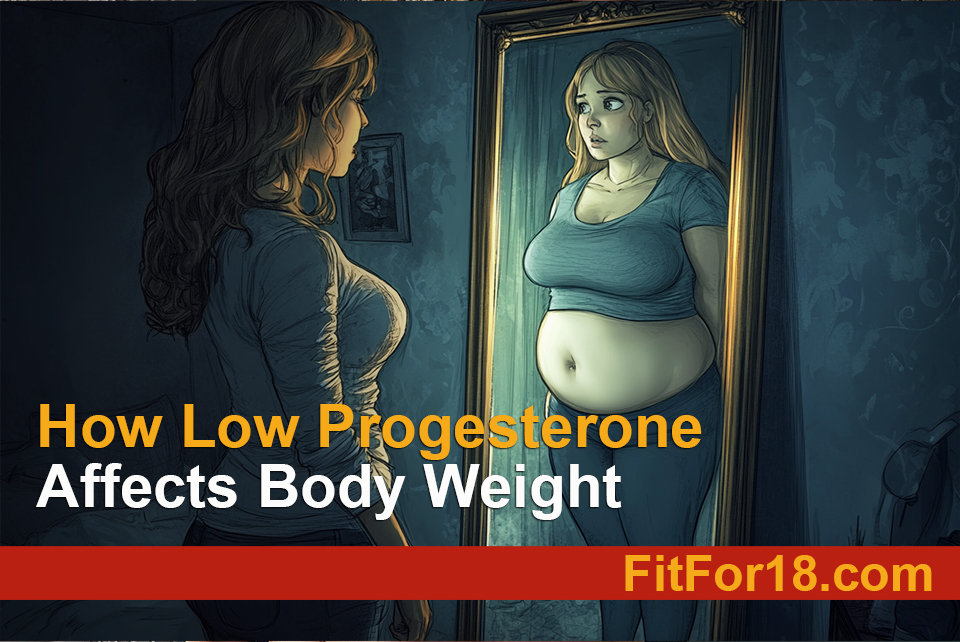The Weighty Issue
Hormones play a crucial role in regulating various bodily functions, including metabolism, mood, and body weight. Among these hormones, progesterone often takes a backseat in discussions about weight management. However, low levels of progesterone can significantly impact body weight and overall health, particularly in women. Understanding how progesterone influences weight can empower individuals to take proactive steps toward better health.
Where is Progesterone Produce
Progesterone is a hormone produced primarily in the ovaries, with smaller amounts produced by the adrenal glands and placenta during pregnancy. It plays a vital role in the menstrual cycle, preparing the uterus for potential pregnancy and maintaining a healthy pregnancy.
How Progesterone Affects the Body
Beyond its reproductive functions, progesterone also influences various metabolic processes, fluid balance, and even mood regulation. Here are a few ways progesterone affects the body.
Hormonal Imbalance

When progesterone levels are low, there can be a relative increase in estrogen levels. This imbalance, often referred to as estrogen dominance, can lead to several issues, including weight gain. Estrogen dominance is associated with increased fat storage, particularly in the abdominal area.
Metabolic Slowdown
Progesterone is known to support metabolic health by promoting the use of fat for energy. Low levels of progesterone can slow down metabolism, making it more challenging for the body to burn calories efficiently. This can lead to weight gain or difficulty losing weight, even with a healthy diet and exercise.
Increased Appetite and Cravings

Low progesterone can impact appetite regulation, leading to increased cravings for carbohydrates and sugary foods. This behavior is often linked to the hormone’s influence on serotonin, a neurotransmitter that helps regulate mood and appetite. When progesterone is low, individuals may find themselves reaching for comfort foods more frequently, contributing to weight gain.
Fluid Retention
Another consequence of low progesterone is fluid retention. Progesterone helps to balance fluids in the body, and when levels are low, women may experience bloating and weight fluctuations. While this may not reflect true fat gain, it can still affect overall body weight and how one feels in their body.
Mood Changes
Low progesterone is associated with mood swings and increased anxiety or depression. These emotional changes can lead to a sedentary lifestyle or emotional eating as individuals seek comfort in food. This behavior can create a cycle of stress and weight gain that can be difficult to break.
What Should I Do If I Have Low Progesterone?
If you suspect that low progesterone levels may be affecting your weight, it’s essential to take proactive steps. Here are some strategies that may help:
Consult a Healthcare Professional
The first step is to consult with a healthcare provider who can assess hormone levels through blood tests and provide tailored recommendations.
Lifestyle Changes

Making lifestyle adjustments can have a positive impact on hormone balance. Regular exercise, particularly strength training, can help boost progesterone levels and improve metabolic health. Additionally, a balanced diet rich in whole foods, healthy fats, and lean proteins can support hormone production.
Stress Management
Chronic stress can contribute to hormonal imbalances, including low progesterone. Incorporating stress-reduction techniques such as mindfulness, yoga, or meditation can help manage stress levels and promote hormonal balance.
Consider Natural Supplements
Some natural supplements may help support progesterone levels. Here are three natural supplements to help with low progesterone levels.
Vitex (Chaste Tree Berry)
Vitex is a popular herb known for its ability to help balance hormones. It works primarily by influencing the pituitary gland, which can lead to increased progesterone production. Many studies suggest that Vitex can help alleviate symptoms of premenstrual syndrome (PMS) and support overall reproductive health.
Maca Root
Maca is a root vegetable from the Andes that is often used as a supplement for hormonal balance. While it doesn’t contain hormones itself, it may help support the endocrine system and promote healthy hormone production, including progesterone. Additionally, maca is known for its potential to enhance energy and improve mood.
Vitamin B6
This essential vitamin plays a crucial role in hormone regulation and can help support progesterone levels. Vitamin B6 is involved in the synthesis of neurotransmitters and hormones, making it important for maintaining hormonal balance. Supplementing with B6 may help alleviate PMS symptoms and support overall reproductive health.
Remember: It’s essential to consult with a healthcare provider before starring any supplementation.
Be Proactive
Low progesterone levels can have a significant impact on body weight and overall health, particularly in women. By understanding the connection between progesterone and weight gain, individuals can take proactive steps to address hormonal imbalances.
Monitoring hormone levels and regularly following up with your physician can help track changes and ensure that any interventions are effective. This may include periodic blood tests to assess progesterone and other hormone levels.
Whether through lifestyle changes, stress management, or consulting healthcare professionals, taking control of hormonal health can lead to improved well-being and a healthier body weight. Remember, maintaining hormonal balance is not just about weight; it’s about fostering overall health and vitality.

Questions About Weight Loss or Fitness?
I'd be happy to help you on your path towards reaching your fitness goals!
RELATED BLOGS

How Peptides Can Help Sugar Levels And Diabetes
How peptides can help people with diabetes keep their sugar levels in a healthy range.

Why Peptides Are a Safer, Smarter Choice Than Ozempic
Ozempic may be the latest crazy, but is it safe? Here is why peptides may be a better alternative.

How Cortisol Affects Body Weight
The physical effects of cortisol and its influence on body weight.

Iron Deficiency Causes, Symptoms, and How Your Diet Can Help!
Understanding iron deficiency and how your diet can help.

Get Moving: Top 5 Physical Activities For a Vibrant Retirement
A list of the top five physical activities that are perfect for retirees.

Losing Weight After Menopause
The challenges of losing weight after menopause and how to boost your chances of weight loss.

Weight Loss Guide for Those with Thyroid Disorders
Lifestyle choices that support weight loss and the well-being for those with thyroid challenges.

Red Wine, The Weight Loss Elixir
The benefits of red wine and how it can help you through your weight loss journey.

Can Health Issues Cause a Low Sex Drive?
How certain health issues can lower your sex drive and how to work on increasing your libido.

Lose Weight Like Tamia
How Tamia lost 55 pounds on 3 months with Travis Johnson.

